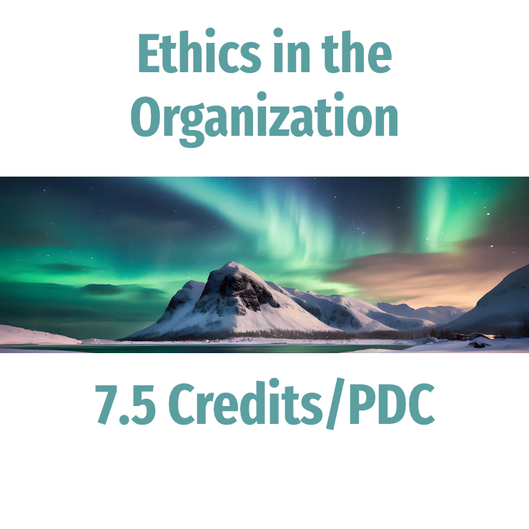Ethics in the Organization (Intl Version)
Ethics in the Organization
This self-paced course consists of reading and/or listening to content and answering assessment questions.
By the end of these courses, you should be able to:
Consequences of Ethical Decision Making
- define morality and ethical conduct
- discuss the characteristics and generality of ethical principles
- describe a framework for making ethical decisions using five criteria
- describe the concept of ethical egoism and explain how to apply it
- explain the principle of utilitarianism and how to apply it
Principles of Ethical Decision Making
- explain the concept of deontology and identify the three major deontological theories
- describe how divine commandments are used to make ethical decisions
- explain the concept of natural law and explain how it is used to make ethical decisions
- explain how universalism is used to make ethical decisions
- describe how ethical issues should be examined using the different ethical principles
Moral Leadership and Character Development
- define moral character and the continuum on which it is found
- describe the lives of heroes who exhibited great moral character
- explain the different stages of character development
- identify the processes involved in character development
- explain the differences between honesty and integrity
- describe the fraud model and explain why sometimes even good people go wrong
- explain the relationship between attitudes and behavior and how this contributes to character development
- describe the differences between transactional and transformational leadership
- explain how leaders can contribute to the development of moral character
Ethics
- define ethics and explain HR’s role in organizational ethics
- explain role morality and how it relates to ethics in an organization
- explain the inducements-contributions balance
- describe the role of HR in an organization with regards to ethics
- describe situations that would be considered a conflict of interest
- explain the importance of an organizational code of ethics
- describe an effective ethics training program
- explain how to use systems and policies to encourage ethical behavior
Successful completion of this course requires passing all of the assessments at 100 percent. The assessments can be taken multiple times. Upon successful completion of these courses you can download a certificate of completion and access the pre-approved Activity IDs from the Completed tab on the MY COURSES page.
These courses will automatically be added to your user account within 5-10 minutes of placing your order. Access to HRrecert courses is granted for 24 months from the date of purchase. Internet access is required to view these courses.
The HRrecert courses are copyrighted material and may not, in whole or in part, be printed, copied, shared, or reproduced by any means for any reason without prior written consent. Access to the HRrecert courses are for your individual use; your account is not to be shared with others. Any violation of these terms and conditions will result in immediate termination of your access to these materials, with no refund provided.
Minimum System Requirements
Operating System:
- Windows: Minimum – Windows 10 version 1903, Recommended – Windows 11 (newest version)
- Macintosh (macOS): Minimum – macOS 12 (Monterey), Recommended – macOS 14 (Sonoma)
Computer Hardware:
- CPU: Minimum- 2 GHz, Recommended- 2 GHz, 4 core
- RAM: Minimum- 4 GB, Recommended - 8 GB
Browser Compatibility:
- The two most recent versions of Chrome
- The two most recent versions of Firefox (Extended Releases are not supported)
- The two most recent versions of Safari (Macintosh only)
*Internet Connection Speed: Stable internet connection of at least 5 Mb download / 5 Mb upload speeds
